Updated: The big list of Google Easter eggs
A surprise with each search.
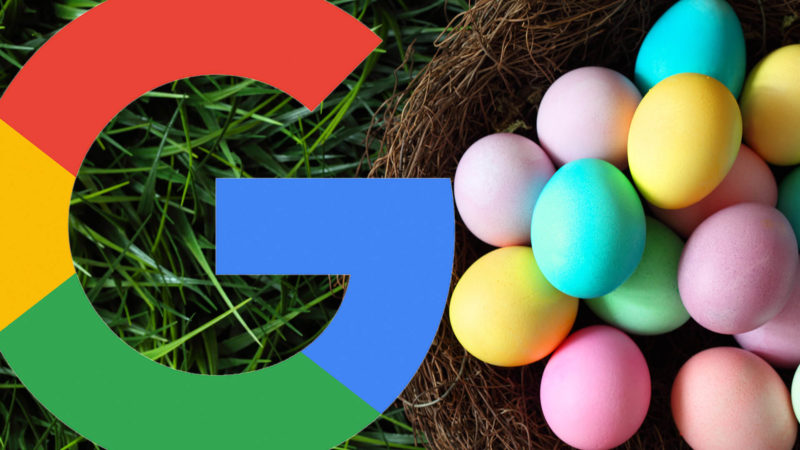
We’ve updated this post to include new Easter eggs that Google has placed as part of its 20th anniversary celebration.
Google is well-known for its lighter side, including things like whimsical logos, April fools’ gags and more. Here’s a big list of “Easter eggs” that Google engineers have hidden for enterprising searchers who take the time to hunt them down.
Easter eggs? “A virtual Easter egg is an intentional hidden message, in-joke, or feature in a work such as a computer program, webpage, video game, movie, book, or crossword,” according to Wikipedia.
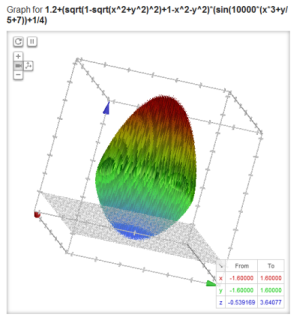
A classic Google example: An animated, rotating graph of a 3D easter egg (click the link to see the animation).
It’s sometimes hard to tell the difference between a classic “Easter egg,” something hidden in the works that you have to hunt for to reveal, and special features Google turns on to celebrate a particular occasion or notable event. Many people refer to the latter as Easter eggs, even though they’re generally transitory and impossible to find once Google has turned them off.
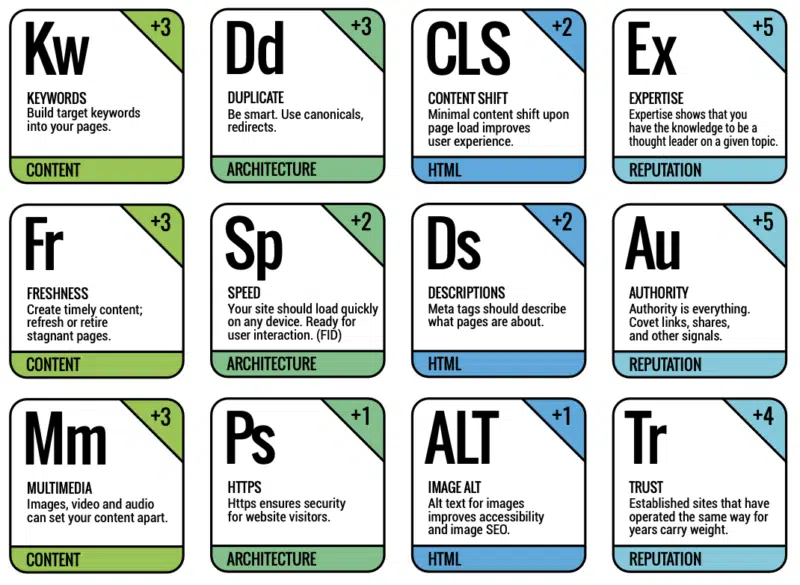
While SEO is indeed an art, it is also a science. Learn about the elements of a successful SEO strategy in Search Engine Land’s SEO Periodic Table.
Some of these “transient” Easter eggs have been turned on to coincide with holiday celebrations, such as searching for a phrase with “xmas” or “christmas” which triggered a string of colorful lights under the search bar. Similarly, during roughly the same time period, searching for “hanukkah” included a row of lights shaped like the Star of David, and searching for “kwanzaa” included a row of Kinara candles.
While these are fun, I don’t consider them to be “true” Easter eggs, so the focus of this post will be on “permanent” Easter eggs that you can search for and find yourself any time. Most of the Google Easter eggs are clever and funny; some require specialized knowledge, as you’ll see in many of the examples below.
Google search Easter eggs
Search for Askew
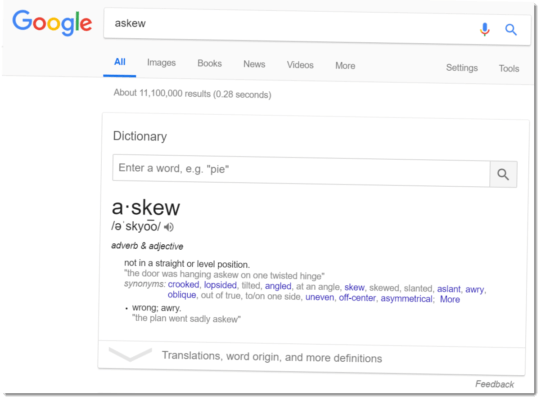
Sometimes, Google alters search results to display a literal interpretation of your query. Search for “askew” and sure enough, your results will be displayed slightly akimbo. No SEO manipulation here — they still function as “normal” search results, but they just look crooked.
Search for Recursion
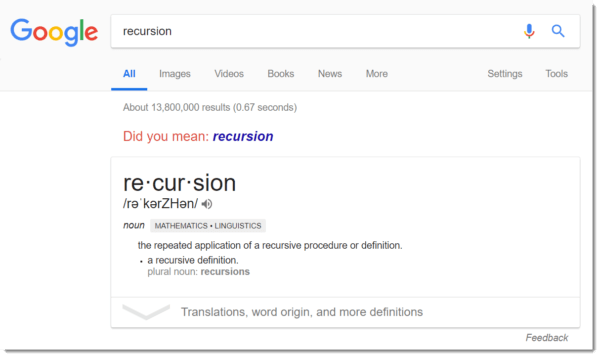
According to Wikipedia, “recursion … is the process of repeating items in a self-similar way. The most common application of recursion is in mathematics and computer science, in which it refers to a method of defining functions in which the function being defined is applied within its own definition. As a logical next step, Google asks, “Did you mean: recursion?”
Search for the answer to life the universe and everything
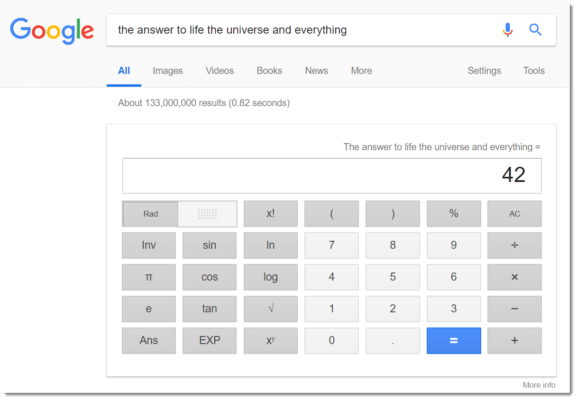
In his classic book The Hitchhiker’s Guide to the Galaxy, Douglas Adams wrote “the answer to the ultimate question of life, the universe and everything is 42.” For years, people have been trying to decipher the “hidden” meaning behind the number 42, but Adams himself, late in life, said “The answer to this is very simple. It was a joke. It had to be a number, an ordinary, smallish number, and I chose that one. Binary representations, base 13, Tibetan monks are all complete nonsense. I sat on my desk, stared in to the garden and thought 42 will do. I typed it out. End of story.” Nonsense or not, Google’s calculator returns the number 42 in response to this query.
Search for do a barrel roll
A barrel roll is an airplane maneuver where the pilot executes a complete 360 degree roll while continuing to fly forward at a consistent altitude—as if the landing gear of the plane were rotating around the inside of a barrel. Google took a bit of poetic license with this definition, “spinning” the result page through a 360 degree loop. Click the link above to see it in action for yourself.
Search for zerg rush
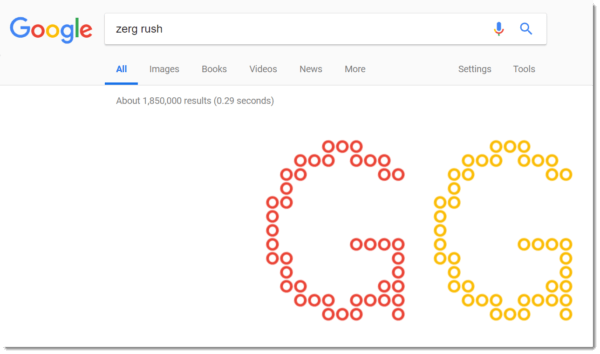
A “zerg rush” is a tactic originated in the video game Starcraft that involves swarming a low-level or poorly equipped group against an opposing group in the hope that sheer numbers will overwhelm the enemy. Search for zerg rush and you’ll trigger a simplified example of a zerg rush using a swarm of “O’s”, ending up with the traditional “GG” (meaning “good game”). Tip: Clicking an “O” three times kills it—but that may not help, as another swarm has been wiping out search results starting with the bottom of the page.
Other Easter eggs let you play a fully-functioning versions of classic video games, such as Atari breakout, PacMan and Snake.
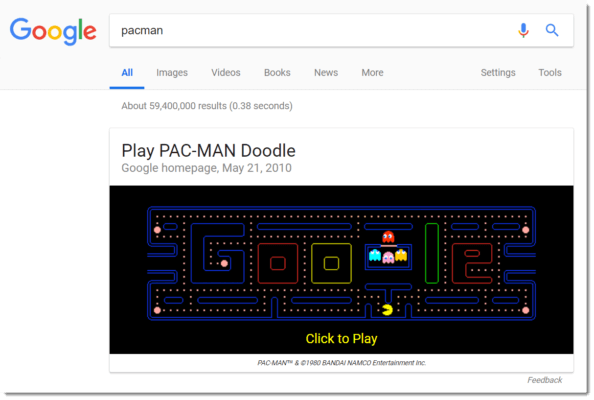
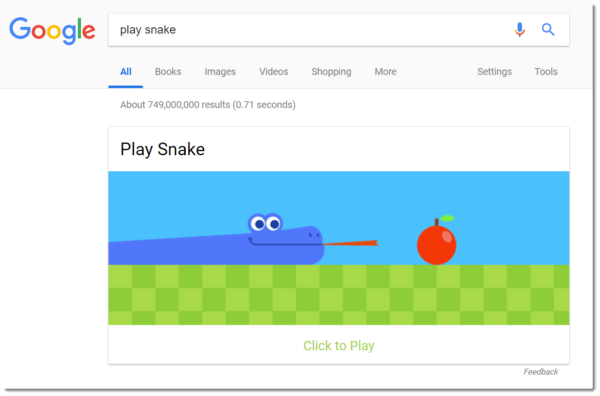
Looking for more traditional games? You can also play Google’s version of Solitaire or tic-tac-toe.
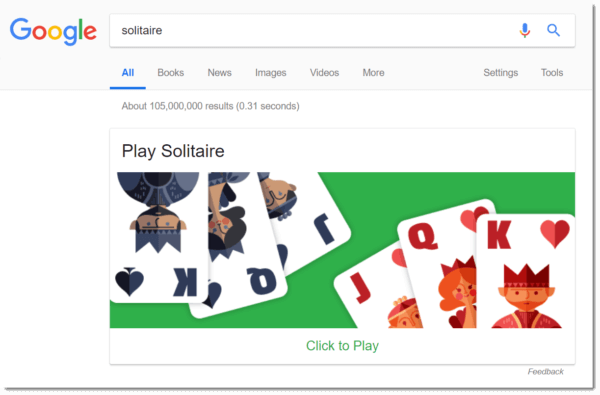
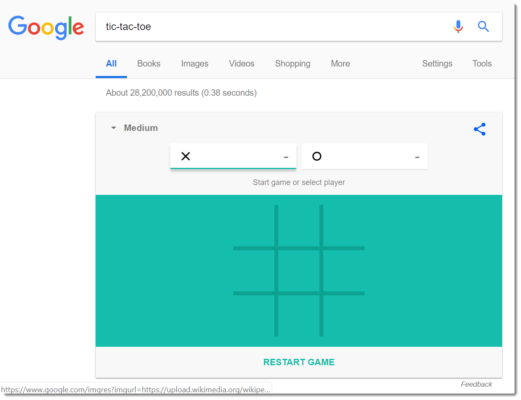
If you’re a fan of text-based adventure games, and are using the Chrome browser, try this:
Search for “text adventure“
In the upper right corner of the browser window, click the three vertical dots that let you customize and control Google Chrome, and select More Tools > Developer Tools from the dropdown menu.
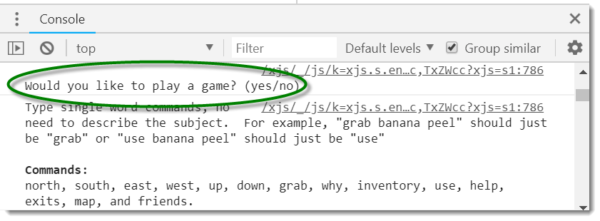
You’ll see a console in the lower right. There will be several text messages, including one that asks “Would you like to play a game?” Type the word “yes” in response, and you’re off on a guest to reunite the blue letter G” with “your friends red o, yellow o, blue g, green l, and the always quirky red e” – in other words, to find and assemble the word Google during the course of your adventure. The game should take between 30 minutes and an hour to complete.
Search for “conway’s game of life“
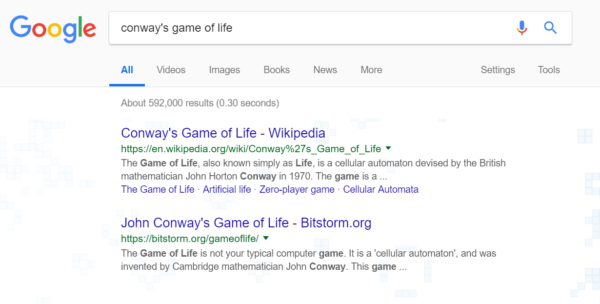
British mathematician John Horton Conway devised one of the first computer simulations of “life,” allowing observation of various stages of “evolution” of cells as they interact with one another over time. Conway’s “game” is quite simple – as a “player” you simply create an initial configuration of cells, turn it on, and watch it evolve, with no further interaction. The simulation has been widely used in many areas of computer science research.
Search for “anagram“
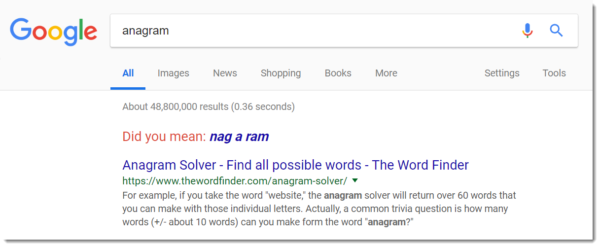
Anagrams are a form of word play, requiring both creativity and a strict adherence to the “rules.” An anagram is the rearrangement of a word or phrase into a different word or phrase, using exactly the same letters but in a different order or sequence. The cleverest anagrams often result in puns or clever innuendo, such as “Clint Eastwood” (an anagram of “old west action”) or for fans of the long-running TV show Doctor Who, a reference to another show in that fictitious universe, an acronym of “Doctor Who” itself, “torchwood.”
Search for “define anagram“
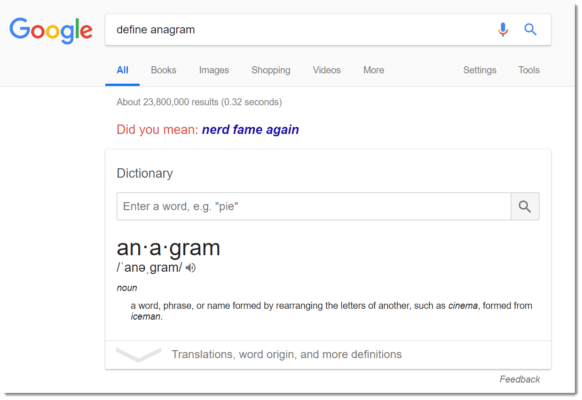
Google will present you with a dictionary definition of any word if you preface your query with the word “define.” A definition provides information about the word type, its phonetic pronunciation and often a link to hear how the word is pronounced. In the case of “define anagram” it also offers a clever “Did you mean” alternative.
Search for “bletchley park“


During World War II, the use of encryption in communications improved dramatically. The Allies established code-breaking efforts at a top-secret facility at Bletchley Park, a quaint Victorian compound a little over an hour northwest of London. The Easter egg celebrating the facility simulates what a de-scrambling effort on the encrypted phrase “Bletchley Park” might have looked like on some of the decryption machines employed by the code-breakers.
Google calculator Easter eggs
Google’s calculator could technically be thought of as an extension of the search engine – to use it you simply enter equations or expressions directly into the search box and your result appears at the top of search results. Here are some of the more amusing calculator easter eggs:
Search for “once in a blue moon“
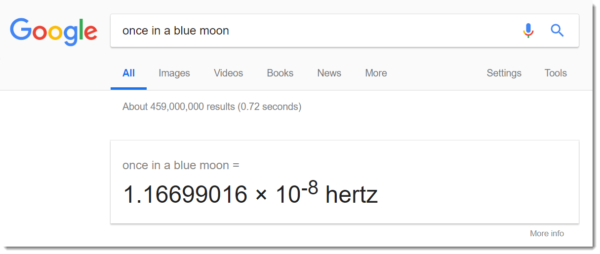
Google also offers helpful results for common number-related cliches. Search for “once in a blue moon” and you’ll get “1.16699016 × 10-8 hertz” as an answer. Why? Convert the result from seconds (one hertz is one cycle per second) into years, and you’ll get about 2.7 years—the approximate amount of time between each “blue moon.” Why again? the phrase “blue moon” has nothing to do with the color of the moon. Rather, it refers to a month when there are two full moons, which due to the variation of the lunar cycle and our calendar works out to about one blue moon (a second full moon in a single month) every three years.
You can also have some fun with the Google calculator with numeric phrases like “a bakers dozen“, “the loneliest number” and “the number of horns on a unicorn.”
If you’re a real math geek, you can create elaborate equations that Google will compute and then graph as a recognizable shape, such as the easter egg above. Here’s one, graphed from the following equation:
sqrt(cos(x))*cos(300x)+sqrt(abs(x))-0.7)*(4-x*x)^0.01, sqrt(6-x^2), -sqrt(6-x^2) from -4.5 to 4.5
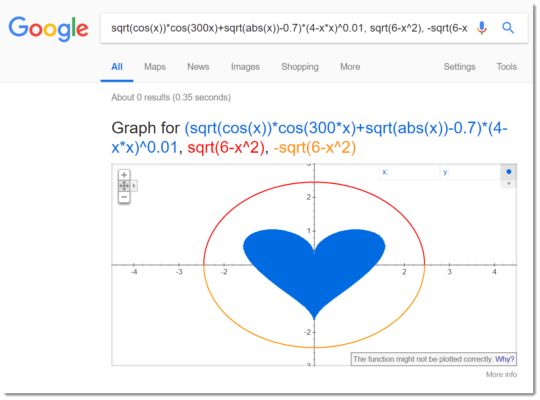
An easter egg that’s probably more appropriate for Valentine’s day.
Retired Google Maps Easter eggs
Google maps used to have some funny Easter eggs. They disappeared several years ago, presumably because some Darwin award winner took directions literally with predictable results. You can no longer replicate these in search results, but they’re amusing to bring back from the archives.
Walking Directions: The Shire To Mordor
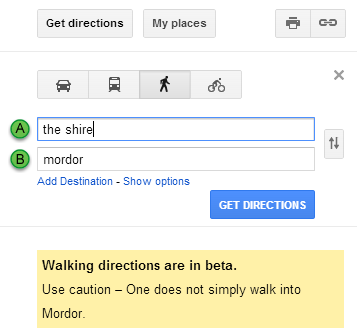
Walking Directions: China To Japan

Finally, here are a few Easter eggs that need no explanation:
Self-explanatory Easter eggs
- Search for “roll a dice“
- Search for “flip a coin“
- Search for “blink html“
- Search for “metronome“
- Search for “spinner“
Third-Party Google Easter Eggs
Google’s not the only one creating Googly easter eggs. Here are a few Easter eggs created at Google’s “expense” by others back in 2013:
- Google gravity collapses the Google home page as if it were caught in a black hole.
- Google space. The Google home page meets Angry Birds.
- Google sphere. What it says.
- Where’s Chuck Norris?. Heh. “Google won’t Search for Chuck Norris because it knows you don’t find Chuck Norris, he finds you.”
- Epic Google. When Google get’s too big for its own good?
Google will undoubtedly keep releasing Easter eggs — and keep people searching.
Contributing authors are invited to create content for Search Engine Land and are chosen for their expertise and contribution to the search community. Our contributors work under the oversight of the editorial staff and contributions are checked for quality and relevance to our readers. Search Engine Land is owned by Semrush. Contributor was not asked to make any direct or indirect mentions of Semrush. The opinions they express are their own.


